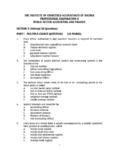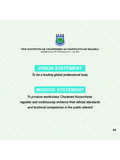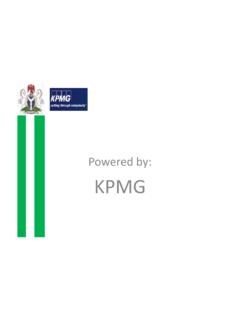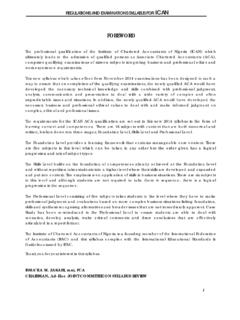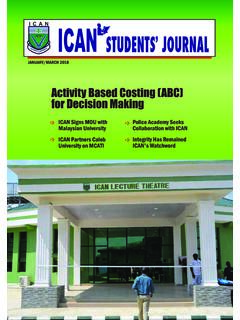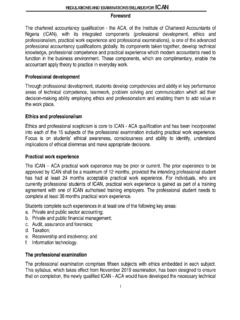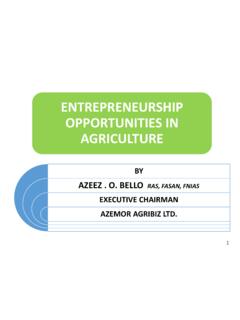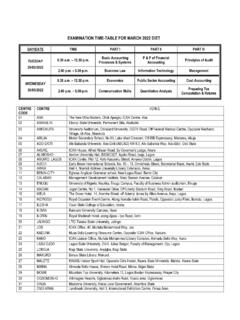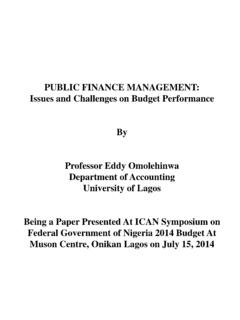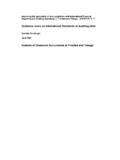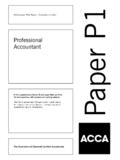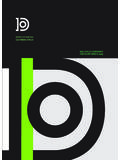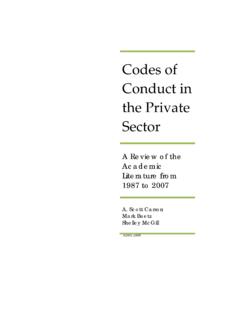Transcription of FUNDAMENTALS AND PRINCIPLES OF AUDIT - ICAN
1 1 FUNDAMENTFUNDAMENTFUNDAMENTFUNDAMENTFUND AMENTALS AND PRINCIPLES OFALS AND PRINCIPLES OFALS AND PRINCIPLES OFALS AND PRINCIPLES OFALS AND PRINCIPLES OBJECTIVESLEARNING OBJECTIVESLEARNING OBJECTIVESLEARNING OBJECTIVESLEARNING OBJECTIVESA fter studying this chapter, readers will be able to:!Appreciate fundamental PRINCIPLES of auditing.!Develop auditing skills and applicable techniques.!Understand the concepts of AUDIT independence, objectivity, integrity, confidentiality,due care and competence.!Understand the concept of true and fair view associated with expressing an chapter covers FUNDAMENTALS and PRINCIPLES of auditing. Readers will beacquainted with the various concepts of auditing, develop auditing skills andexplore various techniques required for effective financial statement auditor may be engaged to perform statutory and non-statutory roles ofauditing.
2 In this regard, the professional body to which an accountant belongssets out the fundamental PRINCIPLES expected to guide his conduct in renderingservices to his varied clients. The guidance is contained in a set of rules usuallyreferred to as code of Ethics for Members. The code when taken with theethical guidance issued by the professional bodies, for example, the Rules ofProfessional Conduct for Members issued by The Institute of CharteredAccountants of Nigeria, ensure that the professional accountant maintains thehighest quality of performance and public confidence in the auditor also needs to ensure compliance with the accounting and auditingstandards in the discharge of his professional duties. There are sanctions forerring members, ranging from loss of membership status in grievous cases, toreprimands and fines on non-grievous auditor should have good knowledge of auditing techniques, theirlimitations, AUDIT evidence and documentation.
3 The use of auditing techniques, AUDIT evidence and proper documentation enable the auditor to accomplishhis or her statutory (or other) roles in a manner that leaves other professionalswho may need to review or evaluate his working papers in no doubt as to thenature of work done, actually meeting professional standards and reallysupporting the AUDIT AND ASSURANCEThe need for strict adherence to ethical rules and guidance on independence,objectivity, integrity, confidentiality, skills, due care and competence enablethe auditor to act in a professional manner and earns the auditor the respect ofthe investing public and entrepreneurship. It also enables the auditor tomoderate his or her conduct, on regular basis, so as not to run foul of theregulations of his professional bodies, as well as the law.
4 A recent developmentis the passing of a law under which a professional accountant, whether inpractice or in business, who fails to see to proper compliance with accountingstandards in Nigeria, may, on conviction, be fined or concepts of true and fair view, materiality and judgement guide the auditorin the conduct of his assignment. The concepts help the auditor to know thelevel and quantum of the transactions and balances to which he should payattention, and matters which need to be considered in the expression of AND OBJECTIVES OF AUDITDEVELOPMENT AND OBJECTIVES OF AUDITDEVELOPMENT AND OBJECTIVES OF AUDITDEVELOPMENT AND OBJECTIVES OF AUDITDEVELOPMENT AND OBJECTIVES OF AUDITA uditingAuditingAuditingAuditingAuditingA uditing is broadly defined as a systematic process of objectively obtainingand evaluating evidence in respect of certain assertions about economic actions and events, to ascertain the degree of correspondence between those assertionsand established criteria and reporting the results to interested usually covers a particular period of time.
5 Auditing may be narrowlydefined as a written report on the examination of financial statements for aparticular period of auditingIndependent auditingIndependent auditingIndependent auditingIndependent auditingThe International Federation of Accountants (IFAC), recognising theresponsibilities of the accountancy profession and considering its own role tobe that of providing guidance, encouraging continuity of efforts and promotingharmonisation, has deemed it necessary to establish an international code ofEthics for Professional Accountants to be the basis on which the ethicalrequirements ( code of ethics, detailed rules, guidelines, standards of conduct,etc.) for professional accountants in each country should be Nigeria, the auditor is expected to comply with the Rules of ProfessionalConduct for Members, issued by The Institute of Chartered Accountants Auditors code 011 titled Fundamental PRINCIPLES of Independent Auditing published by the Auditing Practices Board (APB) in the United Kingdom setsout the fundamental PRINCIPLES expected to guide the conduct of auditors inrendering services to their varied clients.
6 The code when taken with the ethicalstandards issued by the professional bodies to which the auditor belongs (forexample, the code of Conduct issued by The Institute of Chartered Accountantsof Nigeria) and if regularly followed, ensure that the professional accountantmaintains the highest quality of performance and public Auditors code describes independent AUDIT as providing reasonableassurance that published audited financial reports are free from material mis-statement and are in accordance with legislation and relevant Nigerian Accounting Standards Board (NASB) is charged with theresponsibility of developing and publishing accounting standards to beobserved in the preparation of financial statements in Nigeria. The Companiesand Allied Matters Act makes it mandatory for auditors to ensure that thefinancial statements prepared in Nigeria comply with the accounting standardsissued by the NASB.
7 The Nigerian Accounting Standards Board Act, 2003 furtherseeks to promote and enforce compliance with the accounting standards to beobserved in the preparation of financial is noteworthy to mention that users have much confidence in the auditedfinancial reports, bearing the seal of a Chartered Accountant. Auditors add tothe reliability and quality of financial reporting. The reports of the auditorsadd credibility to the financial information prepared and published by thedirectors or officers of an auditor also prepares a management report which contains matters whichhave come to his attention in the course of the assignment, together withrecommendations for improvement in the internal control and business of thecompany. The management report, also called domestic report, is normallyaddressed to the directors of the PRINCIPLES of independent auditingundamental PRINCIPLES of independent auditingundamental PRINCIPLES of independent auditingundamental PRINCIPLES of independent auditingundamental PRINCIPLES of independent auditingThe Auditors code , published by APB, prescribes nine fundamental principlesof independent auditing, as follows:(a)AccountabilityAccountabilityA ccountabilityAccountabilityAccountabilit yAuditors act in the interests of primary stakeholders, whilst havingregard to the wider public identity of primary stakeholders is determined by reference to thestatute or agreement requiring an AUDIT .
8 In the case of companies, theprimary stakeholders are the general body of investors.(b)IntegrityIntegrityIntegrity IntegrityIntegrityAuditors should act with integrity, discharging their responsibilities withhonesty, fairness and truthfulness. Integrity helps to insulate auditorsfrom matters of conflict of interests and elevate their information obtained in the course of the AUDIT is disclosedonly when required in the public interest, or by operation of law.(c)Objectivity and independenceObjectivity and independenceObjectivity and independenceObjectivity and independenceObjectivity and independenceAuditors should be seen to be objective in all their dealings with theirclients. They express opinions independent of the entity and its AND PRINCIPLES OF AUDIT4 AUDIT AND ASSURANCE(d)CompetenceCompetenceCompeten ceCompetenceCompetenceThis is the ability to carry out professional duty with great knowledgeand skills.
9 Auditors should exhibit competence, derived from theacquired qualifications, training and practical experience. Auditingdemands understanding of financial reporting and business issues,together with expertise in accumulating and assessing the evidencenecessary to form an opinion.(e)RigourRigourRigourRigourRigou rAuditors approach their work with thoroughness and attitude ofprofessional scepticism. This was emphasised in the famouspronouncement of Lord Dennins, which states that an auditor is not ablood hound, but should approach his job with professional scepticismbelieving that someone, somewhere, has made a mistake and that acheck needs to be carried out to ensure that no such mistake was madeand this forms the whole essence of auditing. Auditors assess criticallythe information and explanations obtained in the course of their workand such additional evidence as they consider necessary for the purposeof their audits.
10 (f)JudgementJudgementJudgementJudgementJ udgementAuditors apply professional judgement, taking account of materialityin the context of the matters on which they are reporting.(g)Clear communicationClear communicationClear communicationClear communicationClear communicationAuditors reports contain clear expressions of opinion which are set outin writing for proper understanding.(h)AssociationAssociationA ssociationAssociationAssociationAuditors allow their reports to be included in documents containing otherinformation only if they consider that the additional information is notin conflict with the matters covered by their reports and that they haveno cause to believe it to be misleading.(i)Providing valueProviding valueProviding valueProviding valueProviding valueAuditors add to the reliability and quality of financial reporting.
